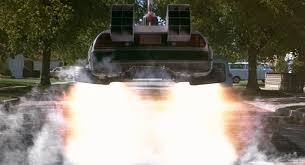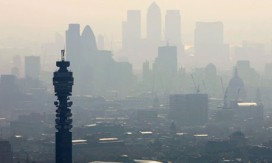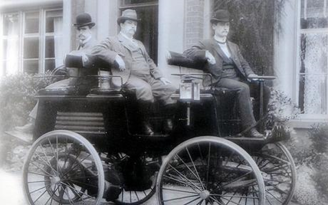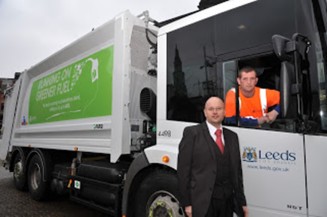 How comes we don’t drive flying cars?
How comes we don’t drive flying cars?
If films like Back to the Future 2, Star Wars or Blade Runner taught me anything, it was that the future would be flying cars. However, the reality is that we don’t have them because we don’t need them. Instead, we’re starting to see the rise of hybrid or electric vehicles (EV).
 Why? Because there is evidence to show the motor car creates large amounts of pollution in city centres and along our major motorways. The amount of particulate pollution caused by diesel engines in particular is a major cause for concern.
Why? Because there is evidence to show the motor car creates large amounts of pollution in city centres and along our major motorways. The amount of particulate pollution caused by diesel engines in particular is a major cause for concern.
Last year the World Health Organisation named Leeds as one of nine English towns and cities that breached safety guidelines for air pollution. Furthermore, Leeds was included in a Supreme Court ruling in April stating that the air quality in a number of UK cities needs to be addressed. If that was not enough, an estimated 350 people die prematurely in Leeds every year because of air quality and pollution related health conditions – with many more adversely affected.
What are we doing in Leeds?
I believe that Leeds has a responsibility to tackle the issue head on. As part of Leeds City Council’s commitment to improving the city’s air quality, we are taking action and putting plans in place through our wider Reducing Carbon programme.
The programme is made up of a range of projects that will contribute to this work and tackle poor air quality. Our programme aims to reduce carbon and particulate emissions that contribute to climate change and cause air quality issues in the city. It covers four key themes
- Public Sector Fleet
- Sustainable Fuel Infrastructure
- Taxi and Private Hire Fleets
- Bus Operators
Leeds City Council has committed to producing a draft Low Emission Strategy by the autumn of 2015. We want to set an example for other organisations in the city to follow by introducing alternative fuel vehicles and reducing emissions from our ‘grey fleet’ or work vehicles.
We know that we cannot do this on our own. We are already working in partnership with taxi and bus operators who are also looking at how they can transform their fleets. We all recognise the importance of working together to make Leeds a cleaner and greener place to live, work – and to drive through!
Public Sector Fleet
We want our fleet to run on alternative fuels that are greener than the petrol and diesel engines we have traditionally used. We are looking at the options open to us, but two things are clear: there are no quick fixes and there are limits to the short-term changes we can make.
Two of the main issues we are facing are the availability and affordability of alternative fuels. We also know that the infrastructure to support this transformation is not yet in place, current arrangements will need to be extended and new ones introduced.
Electric Vehicles
Thomas Parker (centre) on board the world’s first electric car in London, 1884.
EVs are an environmentally friendly option – with zero tail pipe emissions and low running costs. Many think that they are a recent innovation but they are not a new concept. Thomas Parker – who worked on the electrification of the London Underground – claimed to have invented the electric car in 1884. How many of us are familiar with electric milk floats that have been used for decades.
Some criticisms of EVs have been true: range has been questioned and capacity has not been as good as some people would prefer – long distance journeys in EVs are generally avoided. However manufacturers are taking these on board and there are on-going developments to improve in these areas.
As their relative price continues to fall, we can expect to see more ultra-low emission electric vehicles on the road.
EVs are ideal for low mileage, low range use. The majority of the smaller vans in our fleet fit this profile, making short trips in and around the city. They are becoming a feasible alternative to diesel, with vehicles that are a cleaner, quieter and cheaper to run. We have already invested in a small number of electric vehicles and we are introducing many more to our fleet of small vans.
Gas Fuelled Vehicles
Electric vehicles are not the only option – other fuel types are more appropriate for larger vehicles.
 Gas fuelled engines offer an efficient alternative to diesel for larger vehicles – with zero particulates and carbon emissions being up to 60% lower in comparison to diesel. Some of our refuse collection vehicles have been running on Liquefied Natural Gas (LNG) for a number of years, and we are looking at how we can increase the number of gas-fuelled vehicles in our fleet.
Gas fuelled engines offer an efficient alternative to diesel for larger vehicles – with zero particulates and carbon emissions being up to 60% lower in comparison to diesel. Some of our refuse collection vehicles have been running on Liquefied Natural Gas (LNG) for a number of years, and we are looking at how we can increase the number of gas-fuelled vehicles in our fleet.
Other types of gas include Compressed Natural Gas (CNG), which costs significantly less than diesel. Transferring vehicles in our fleet to this type of fuel will help reduce emissions. It will also help to reduce expenditure and help protect us from inflation in fuel prices once we establish a sustainable supply of this fuel.
Infrastructure
It is not enough simply to have a larger number of greener vehicles on the road. We need to ensure that we have in place a sustainable fuel infrastructure across the city. As mentioned earlier – there is a great deal of work that needs to be done to improve the infrastructure in the city.
We are looking at ways to provide a network of charge points for electric vehicles across the city for both public sector and public use.
Our work with partners is aiming to establish a CNG filling station in the city for public sector fleet and commercial operators. This will provide a platform to see a major change in the profile of vehicles on the road in Leeds and support the transition of local fleets from diesel.
Developing the gas infrastructure will allow commercial operators to switch to lower emission, cleaner vehicles. Collectively this will make a significant contribution to reducing the emissions created by a predominantly diesel fuelled fleet of heavy vehicles.
Other public transport operators
As well as improving our own fleet of vehicles, we also want to work with public transport operators to assist them with taking advantage of moving to cleaner fuels.
We are working with the Office for Low Emission Vehicles (OLEV) to access funding that for use on developing low emission fleets and supporting infrastructure across the industry. Replacing diesel buses and taxis locations will have a significant impact upon air quality along major arteries and the city centre.
Even though we don’t have flying cars because we don’t need them the need for new sustainable forms of transport is clear because we do need them. I mentioned Back to the Future at the start, but what we need to do is jump ahead and think what we want Leeds to look and feel like in the next 5, 10 and 15 years. Let’s start investing more in sustainable transport and make a future of improved health and better air quality a reality.
 Andrew Hickford is a Project Manager for the Public Private Partnerships Unit at Leeds City Council. He is currently working on a range of sustainable transport projects for the city including options for a CNG (Compressed Natural Gas) filling station and a low carbon solution for fleet and taxi vehicles.
Andrew Hickford is a Project Manager for the Public Private Partnerships Unit at Leeds City Council. He is currently working on a range of sustainable transport projects for the city including options for a CNG (Compressed Natural Gas) filling station and a low carbon solution for fleet and taxi vehicles.
Still prefer the jet packs Michael Rodd and Raymond Baxter promised us all….
LikeLiked by 1 person
eeds City Council is also safgeuarding railway sidings and canal wharves so that they are available for the movement of freight. This encourages businesses to make a modal shift to non-road based means of freight movement, with the knock on effect of reducing the number of HGVs on the roads and all the benefits that brings.
LikeLike
As someone who runs and cycles into the city center every day I often wonder if I’m doing myself more harm than good. I dread to think how many PM 2.5 and PM 10 particles I’ve inhaled. It would be nice to get my half hour exercise, as part of my commute, without having to worry about my health!
LikeLike
PS – as a result I fully support the above initiatives and will be encouraging our organisation to do the same.
LikeLike